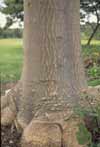Home >
Erythrina x sykesii, Coral Tree
Suited for planting in small residential lots as well as in parks, golf courses and in other large-scale landscapes. Multiple trunks ascend from the lower portion of the main trunk giving rise to a wide-spreading canopy casting dense shade. Lower branches often have to be removed because they eventually droop to the ground if they are allowed to remain on the tree, and included bark is common in the branch crotch.
Trees do not compartmentalize decay well resulting in potentially extensive decay from trunk injuries. Included bark can form in the crotch of main branches, weakening the tree. Prune to one trunk and shorten limbs with bark inclusions to help prevent failure. Trees are tolerant of urban conditions and have performed well as street trees. Pollen can cause mild allergy reactions.






